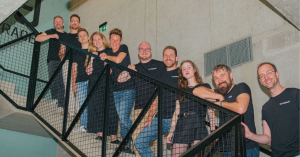The Hungarian Startup Report 2024 dropped last week —and while the big money is still cautious, early-stage energy is picking up. “This is the first year since 2021 that we can talk about real momentum in early-stage. It feels like the ecosystem is starting to believe in itself again,” shared Biás Csongor, Managing Director of Startup Hungary, in Forbes Hungary.
Can Hungary’s startups find their mojo again?
Recent report from Hungary show’s the ecosystem’s total investments held steady at €54 million—still far from previous highs. Growth-stage fundraising is slow, with most major players waiting for better conditions. In contrast, pre-seed and seed deals are still happening, often with international investors stepping in.
There’s also a small but promising uptick in new startup formations. 17% of surveyed companies were founded in 2024, the highest in recent years. AI is clearly driving this wave: 36% of startups now say they build AI-based products, a big jump from last year’s 26%. However, per The Recursive’s AI report, Hungary’s AI ecosystem faced a significant funding decline in 2024, dropping by 47% compared to 2023.
When it comes to technology and sectors, software still dominates, but more teams are moving into deep tech—generative AI, robotics, biotech—looking for a real competitive edge.

After last year’s dip in morale, founder confidence is climbing. Hungarian report shows 44% now believe their company has unicorn potential. Still, going global is a struggle. Only about half of the startups making money are earning it from international customers. The rest are stuck in the local market—usually because they lack capital, networks, or can’t validate fast enough.
Csongor points how hiring is up again after a slow 2023, mostly driven by small and mid-size teams. Sales remains the biggest pain point, even more than fundraising. Fewer startups are turning to the state for support, and more are setting up HQs abroad to access better investment terms and simpler admin.
According to Csongor, 2025 might mark a shift. Not a breakout year yet, but something is clearly moving. Early signs point to a more grounded, globally minded ecosystem, with AI at its center.
This year will tell whether this momentum can last.
Csongor Biás on Hungary’s startup momentum
Csongor Biás shared with us on The Recursive Podcast in January a bit more details on his perspective and vision for the Hungarian startup ecosystem. He emphasized the importance of building an internationally minded startup culture early on. Remembering how it all started back in the days for him, around 2012 at Pioneers Festival, where global and regional players got together.
“Back then, I decided I wanted to create something similar in Hungary. I believed it could really boost the ecosystem. That was the time when companies like Prezi and Ustream—those third-generation Hungarian success stories—started taking off. I wanted to replicate that.”
Now as the Managing Director of Startup Hungary he has a chance to do much more. It is no wonder one of the organization’s core goals became to shape a founder-first, scalable ecosystem. However, most of the work is still on the startup itself. Csongor isn’t down-playing on what it takes: “A high-growth startup should have three components: an innovative product or business model, a scalable business model, and a global vision for world domination.”
Despite strong local talent and growing founder ambition in Hungary, Csongor noted persistent challenges in legal and structural frameworks. Many founders still find themselves forced to “flip” their companies to the U.S. or UK to access global funding and incentives.
He also called attention to the fragmentation of EU startup legal structures, proposing a more unified approach: “Having a paneuropean entity would unify investment standards and significantly reduce friction and fragmentation.”
Startup Hungary continues to advocate for data-driven policy and better founder support, working with local stakeholders and international networks. Csongor insights underline the report’s findings: while Hungary’s ecosystem is evolving, systemic change and global alignment remain key for long-term growth.








